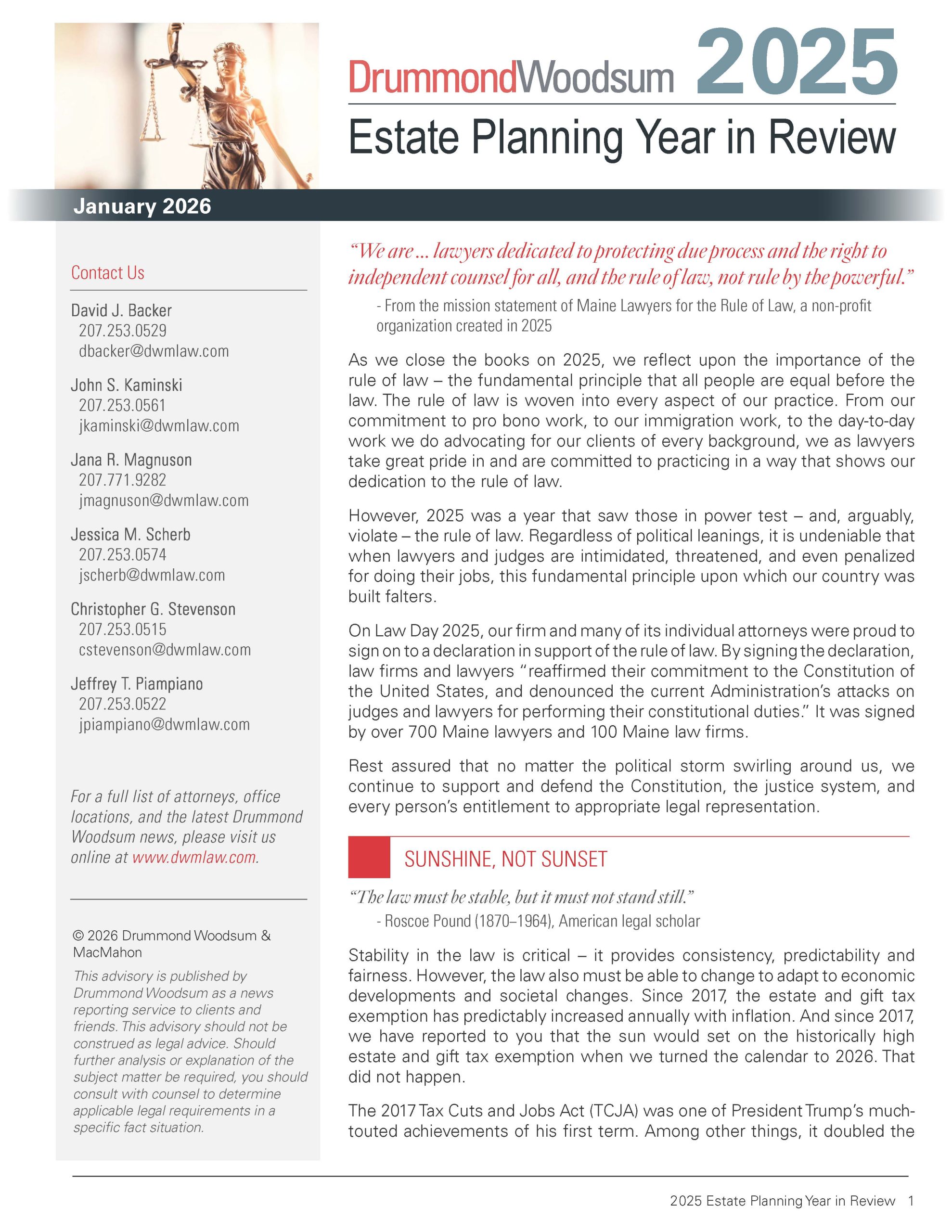Estate Planning & Administration
Home > Practice Areas > Estate Planning & Administration
Practice Overview
Drummond Woodsum’s estate planning and administration team provides a broad array of personal legal services to help our clients accomplish their estate planning goals. In addition to preparing wills, trust agreements, financial powers of attorney, and advance health care directives, which are the foundation of almost all estate plans and are carefully tailored to meet our clients’ specific needs and wishes, we also advise individuals and families on gift and estate taxation, succession planning for business interests and the ownership of family camp/vacation home real estate, charitable giving, retirement plans, pre-marital agreements, planning for incapacity and general tax planning, and other estate planning and administration services.
We represent personal representatives, trustees, and beneficiaries in the administration of trusts and estates and pride ourselves in being able to efficiently implement and put to the test the estate plans we designed for our clients during their lifetime. Our estate planning law and administration law resources include a veteran paralegal staff to assist in the proficient administration of estates and trusts. We also have extensive experience in all types of proceedings in probate courts throughout the State of Maine, including guardianships, conservatorships, adoptions, and will and trust interpretation and administration issues. In collaboration with our firm’s Trial Services Group, we are able to provide skilled representation in all types of contested probate, will, and trust matters.
Our Approach to Estate Planning and Administration Law
In our estate planning, estate and trust administration, and personal tax practices, we are committed to providing prompt, innovative solutions, built upon a thorough understanding of our clients’ circumstances, an appreciation of their personal goals, and an application of our technical expertise.
Our estate planning clients fit no particular mold. We provide estate planning services for clients at every conceivable stage of life. They include young couples who are anticipating the birth of their first child, unmarried individuals, unmarried domestic partners, widows and widowers, business owners, and retirees. People come to us at key times and milestones in their life, sometimes in times of joy and sometimes in times of crisis, and we take great pride in being able to offer advice and help at those important waypoints or crossroads.
We recognize that the need for creative assistance and planning often bears little or no relation to a client’s net worth and we welcome clients without regard to any minimum amount of assets. In helping our clients accomplish their planning goals for themselves and their families, we will always be mindful of the limits of our clients’ resources and will do our best to find efficient ways to meet, and hopefully exceed our clients’ expectations.
The most important estate planning considerations typically have little to do with taxes, but rather, are tied to ensuring that our clients are able to control their property while they’re alive and well, take care of themselves and their loved ones in the event of their incapacity, and give what they have to whom they want, the way they want and when they want . . . and do so in a way that minimizes every professional fee, administrative cost and estate tax possible. Too often, when we meet with clients for the first time, we find that although their existing estate plan may have been created with a focus on minimizing estate taxes, there was little or no consideration for addressing family concerns and goals. In our experience, the things that keep people awake at night have nothing to do with a concern over the amount of estate taxes that might be due at the time of their death. Estate taxes are best addressed as part of the planning process only after we know what the other, more important, planning goals are for our clients.
An important part of the planning process is ensuring that the beneficiary designations of life insurance policies and retirement accounts are coordinated with the foundational estate planning documents. Too often, we see clients who have prepared elaborate estate planning documents but they and their advisors never took the time to ensure that the beneficiary designations for their life insurance policies and retirement accounts match the provisions of their other estate planning documents. As part of our planning processes, we routinely take the time to review your beneficiary designations with you and change them when appropriate to match the rest of your planning goals.
Working with the other members of the firm’s Business Services Group, we are able to successfully integrate all facets of business planning into the estate planning process, including business continuation in the event of incapacity or death, and the transition of business ownership from one generation to the next.
We pride ourselves in the resourceful use of trusts and our ability to help clients find thoughtful and appropriate ways to leave an inheritance to children and grandchildren. These include protecting an inheritance from the potential claims of a beneficiary’s creditors or a possible divorcing spouse and encouraging beneficiaries to become productive members of society and develop the skills and ability needed to take care of themselves and those who are dependent upon them for their care and support. Proper trust planning requires consideration of many questions such as: How much control should the trust beneficiary have over the trust assets? At what age should the beneficiary have the right to know of the existence of the trust and receive reports about the trust assets? Who is the best choice to serve as trustee? How much control should the beneficiary have over removing and replacing the trustee? How much discretion should the trustee have over the distribution of the trust assets? Should provisions be included to permit someone to change the trust in the future if unforeseen circumstances arise? Are there tax or non-tax benefits to making the trust last for the beneficiary’s lifetime? Estate planning, when done well, is an imaginative and interactive process, and far from a “one size fits all” proposition.
We approach estate planning from the perspective that it’s our role to teach our clients about the law and the various planning options available to them that they might not otherwise be aware of, and that in exchange, it’s our clients’ role to teach us about themselves, their families and their planning goals. Then, together, we can design and implement an estate plan that best accomplishes their goals. Our clients enjoy the creative process and the most common comment we hear from our clients after completing their estate planning, or an update of a previous plan, is “Thank you. I’ll sleep better knowing that this is done.”
We welcome the opportunity to meet with you to introduce you to our approach and process to estate planning
Practice Group Leader
Related Professionals
Estate Planning & Administration
July 24, 2025
Super Lawyers Recognizes 27 Drummond Woodsum Attorneys
February 21, 2025
CTA Reinstated and Other Potential Developments
December 27, 2024
NEW UPDATE Regarding the Corporate Transparency Act
December 24, 2024
Corporate Transparency Act Requirements Reinstated
December 12, 2024
UPDATE on the Corporate Transparency Act
October 31, 2024
The CTA: Time is Running Out
August 15, 2024
Best Lawyers in America Recognizes 57 Drummond Woodsum Attorneys
January 23, 2024
Get Ready for the Corporate Transparency Act
November 06, 2023
Drummond Woodsum Named Among Best Law Firms by Best Lawyers for 2024
January 19, 2023
2022 Estate Planning Year in Review
August 22, 2022
Forty Eight Attorneys Recognized by Best Lawyers
January 02, 2022
2021 Estate Planning Year in Review
November 18, 2021
Drummond Woodsum Named Among Best Law Firms by Best Lawyers for 2022
November 15, 2021
Drummond Woodsum Grows to be the Second Largest Law Firm in Maine
August 19, 2021
Fifty Four Attorneys Recognized by Best Lawyers
December 30, 2020
2020 Estate Planning Year in Review
January 02, 2020
2019 Estate Planning Year in Review
November 11, 2019
New England Super Lawyers Recognizes 29 Drummond Woodsum Attorneys
January 02, 2019
2018 Estate Planning Year in Review
August 16, 2018
Best Lawyers in America Recognizes 33 Drummond Woodsum Attorneys
January 02, 2018
2017 Estate Planning Year in Review
January 02, 2017
2016 Estate Planning Year in Review
January 02, 2016
2015 Estate Planning Year in Review
January 02, 2015
2014 Estate Planning Year in Review
January 01, 2014
2013 Estate Planning Year in Review
January 01, 2013
2012 Estate Planning Year in Review
December 28, 2012
Ascertainable Standards
January 02, 2012
2011 Estate Planning Year in Review
January 01, 2011
2010 Estate Planning Year in Review
January 02, 2010
2009 Estate Planning Year in Review
January 02, 2009
2008 Estate Planning Year in Review
January 01, 2008
2007 Estate Planning Year in Review
News





